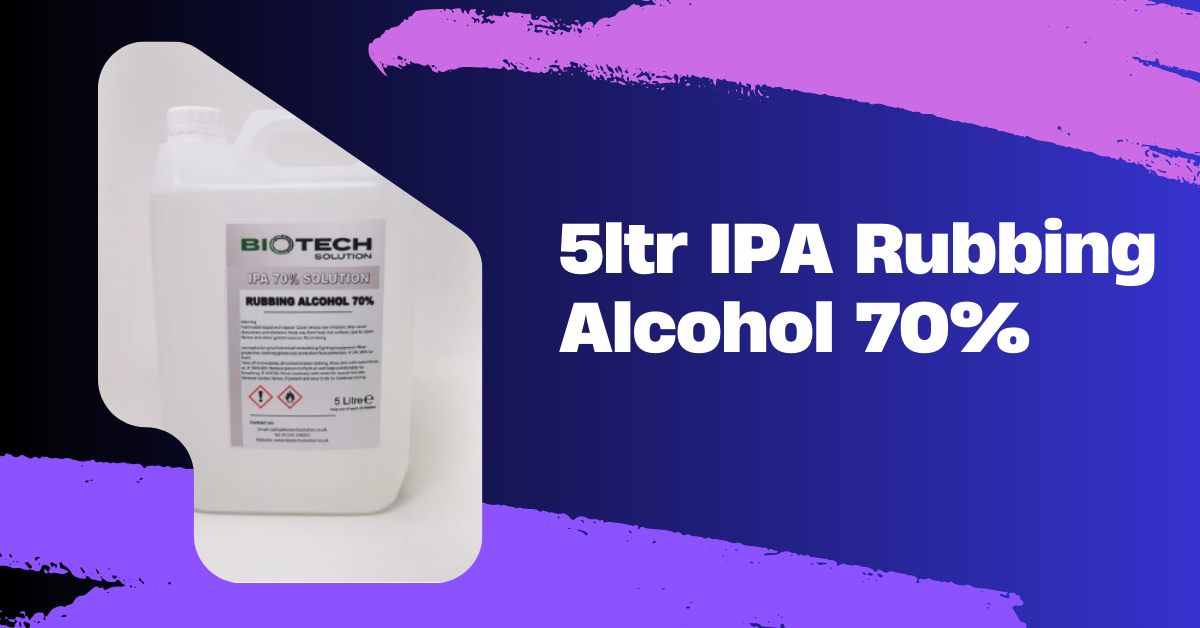7 Effective Uses of Rubbing Alcohol You Need to Know

Rubbing alcohol is a household staple with many uses, from cleaning surfaces to aiding first aid. Also known as isopropyl alcohol, it boasts incredible antiseptic properties that make it indispensable in homes and healthcare settings. Its versatility, affordability, and effectiveness have earned it a trusted place in daily life. Let's explore everything you need to know about rubbing alcohol, including its benefits, proper usage, and precautions.
What Is Rubbing Alcohol?
Rubbing alcohol is a solution made of isopropyl alcohol (IPA) and water, typically in concentrations of 70% or 91%. It serves various purposes, including disinfection, cleaning, and cooling. Its quick evaporation rate and antimicrobial properties make it highly effective for sanitizing surfaces and treating minor injuries.
Health Benefits of Rubbing Alcohol
- Antiseptic for Cuts and Scrapes: One of the most common uses is cleaning wounds to prevent infection. The 70% solution is ideal as it kills germs while being less harsh on the skin.
- Relieves Muscle Pain: Rubbing alcohol is a cooling agent that soothes pain and inflammation when applied to sore muscles.
- Fever Reducer: In emergencies, rubbing alcohol to pulse points can help lower body temperature temporarily.
Quote from Experts:
"Rubbing alcohol is a cost-effective, quick solution for household first aid and hygiene," says Dr. Sarah Collins, a family medicine practitioner.
Everyday Uses for Rubbing Alcohol
- Sanitizing Surfaces: Wipe down counters, phones, and keyboards to eliminate bacteria.
- Deodorizing Shoes: Spraying the insides of shoes with rubbing alcohol can neutralize odor-causing bacteria.
- Cleaning Mirrors and Glass: For streak-free results, dilute rubbing alcohol with water and use it as a glass cleaner.
Is Rubbing Alcohol Safe for Skin?
While rubbing alcohol is effective for external applications, prolonged exposure can dry out or irritate the skin. Always use it sparingly and avoid applying it to large body areas. For sensitive skin, dilute it or use alternative antiseptics like hydrogen peroxide.
Comparison of 70% and 91% Rubbing Alcohol
| Feature | 70% Rubbing Alcohol | 91% Rubbing Alcohol |
|---|---|---|
| Germ-Killing | Effective for most germs | Kills even tough bacteria |
| Skin Friendliness | Less drying | More drying |
| Evaporation Rate | Slower | Faster |
| Usage | Ideal for first aid and cleaning | Best for electronics and stubborn stains |
When in doubt, opt for 70% rubbing alcohol for general use.
Can You Use Rubbing Alcohol to Disinfect Your Home?
Yes! Rubbing alcohol is an excellent disinfectant for frequently touched surfaces like doorknobs and faucets. It can also sanitize makeup tools, thermometers, and reusable masks.
Creative Uses of Rubbing Alcohol Around the Home
- Homemade Air Freshener: Mix rubbing alcohol with essential oils for a DIY room spray.
- Removing Sticky Residue: Effortlessly clean labels, adhesives, and gum with some isopropyl alcohol.
- Emergency Ice Pack: Combine alcohol and water in a plastic bag, freeze it, and use it as a flexible ice pack.
Safety Precautions When Using Rubbing Alcohol
- Ventilation Is Key: Always use rubbing alcohol in a well-ventilated space. Its fumes can cause dizziness if inhaled in large amounts.
- Avoid Open Flames: They are highly flammable and should be kept away from heat sources.
- Keep Out of Reach of Children: Store in a safe, dry place to prevent accidental ingestion.
How Rubbing Alcohol Compares to Other Cleaners
| Cleaner | Key Ingredient | Best Uses |
|---|---|---|
| Rubbing Alcohol | Isopropyl alcohol | Surface cleaning, wound care |
| Hydrogen Peroxide | H2O2 | Whitening, mild antiseptic |
| Bleach | Sodium hypochlorite | Heavy-duty disinfection |
| Vinegar | Acetic acid | Mild cleaning, natural deodorizer |
Interesting Facts About Rubbing Alcohol
- History: First introduced in the 1920s as a surgical antiseptic.
- Shelf Life: Unopened bottles last about 2-3 years; opened bottles should be replaced yearly.
- Quick Evaporation: This property makes it great for cleaning electronics.
Can Rubbing Alcohol Kill Germs?
Absolutely! According to the CDC, alcohol solutions with concentrations of 60-90% are highly effective against bacteria, viruses, and fungi. This is why rubbing alcohol is a key ingredient in many hand sanitizers.
FAQs
What is the difference between isopropyl alcohol and ethyl alcohol?
Isopropyl alcohol is used for disinfecting and cleaning, while ethyl alcohol (ethanol) is often found in beverages and sanitizers.
Can rubbing alcohol remove stains?
Yes! It works wonders on ink, grease, and makeup stains. Dab it on the stain, let it sit, and then wash it as usual.
Is rubbing alcohol safe for cleaning electronics?
The 91% variety is ideal for cleaning electronics because it evaporates quickly, leaving no residue.
Can rubbing alcohol expire?
Yes, over time, its effectiveness diminishes. Always check the expiration date before use.
How do you dilute rubbing alcohol for cleaning?
Mix one part rubbing alcohol with one part water for general household cleaning.
What are the risks of ingesting rubbing alcohol?
Ingesting isopropyl alcohol is extremely dangerous and can cause severe poisoning. Always store it safely.
Conclusion
Rubbing alcohol is a versatile, affordable, and essential product for countless applications in cleaning, health, and everyday life. With proper use and storage, it offers incredible benefits and solutions. Whether disinfecting surfaces, relieving pain, or cleaning electronics, rubbing alcohol is a reliable and practical choice.
- Industry
- Art
- Causes
- Crafts
- Dance
- Drinks
- Film
- Fitness
- Food
- Игры
- Gardening
- Health
- Главная
- Literature
- Music
- Networking
- Другое
- Party
- Religion
- Shopping
- Sports
- Theater
- Wellness
- News


